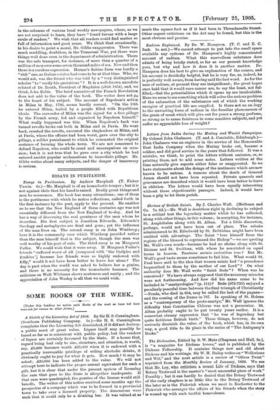Shrines of British Saints. By J. Charles Wall. (Methuen and
Co. 7s. 6d.)—Mr. Wall is doubtless right in declining to subject to a critical test the legendary matter which he has collected, along with other things, in this volume ; in accepting, for instance, St. Amphibalus along with St. Alban. Yet a little discretion, perhaps, would not have been out of place. Tho rebuke administered to St. Etheiwold by St. Brittistan might have been omitted with advantage. The Saint "tore himself from the regions of the blessed to reprimand the Bishop"—we are quoting Mr. Wall's own words—because he had no shrine along with St. Birinus and St. Swithun, with whom he associated on equal terms in heaven. Tantaene animis caelestibus irae ? But Mr. Wall's good taste seems sometimes to fail him. What would St, Paul have said to the idea that women saints had " a precedence bequeathed to them by the mother of our Lord " ? On what authority does Mr. Wall write " Saint Bede" ? When was he canonised? We have always supposed that the necessary miracles were not forthcoming. And how did his name come to be included in " raartyrologies " (p. ill)? Bede (672-735) enjoyed a peculiarly peaceful time between the final triumph of Christianity —Penda, who died in 654, may be called the last of the pagans— and the coming of the Danes in 787. In speaking of St. Helena as a "contemporary of the proto-martyr," Mr. Wall ignores the difficulty that Conatantius Chlorus was not a persecutor. St. Alban probably ought to be put twenty years earlier. It is a somewhat clumsy expression that " he was of legendary but quite fictitious British birth." These things, however, do not seriously diminish the value .of the book, which has, in its own way, a good title to its place in the series of " The Antiquary's Books."






































 Previous page
Previous page